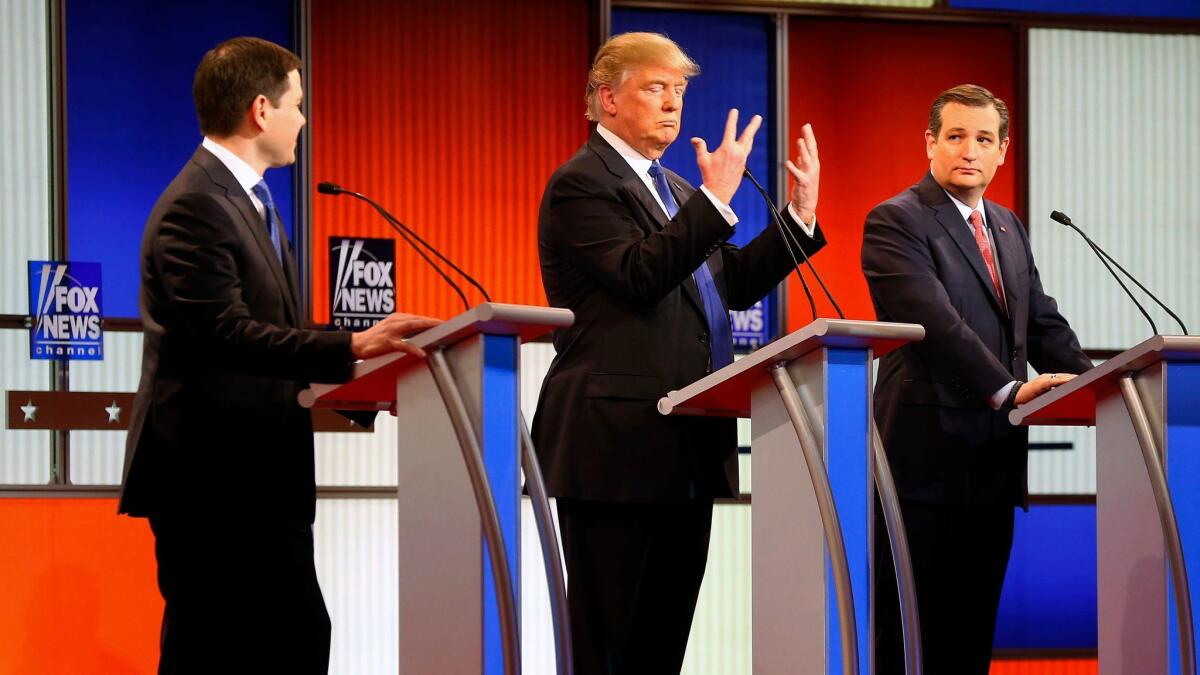Op-Ed: Stop comparing Trump to foreign leaders. He’s a distinctly American phenomenon

- Share via
English-language media have compared President Trump to more than 120 different people, ideas, things and nonhuman life forms in the last 18 months, according to one rough tally, including the Zika virus, Richard III, a Galaxy Note 7, P.T. Barnum and, of course, Adolf Hitler. For a media struggling to understand Trump’s improbable rise to power, “Trump is like X” has become an exceedingly popular genre.
While many of these comparisons are harmless, and often useful, one iteration of this trend — comparing Trump to Latin American, Middle Eastern and Asian leaders — often does double-duty as a way to bash countries hostile to U.S. interests. Not only that, it contributes to the whitewashing of Trump’s quintessentially American origins.
Over the past year and half, Trump has been compared by the media to Chinese leaders eight times, Iranian leaders nine times, and Venezuelan leaders 30 times. By contrast, Trump has only been compared to contemporary white, Western populists like Pat Buchanan and the United Kingdom’s Nigel Farage four and six times, respectively.
Trump’s agenda is largely the same as the broader Republican Party; his rise, moreover, was the logical manifestation of the ... tea party movement.
Again, while some comparisons can elucidate, the practice of analogizing Trump to foreign enemies has the effect of veiling Trump’s right-wing agenda. Pundits who engage in it seem more comfortable criticizing “authoritarianism,” a Davos-friendly catchall, than 21st century conservatism.
Often, they prioritize adherence to norms and governing style over ideological goals, precisely because this approach allows them to, at the same time, praise George W. Bush while treating Trump as beyond the pale, despite the fact that the two men share many of the same political objectives, including a bloated military, economic policies that favor Wall Street and the installation of anti-choice judges on the Supreme Court.
The instinct to constantly connect Trump with socialists like former Venezuelan president Hugo Chavez reveals the intellectual poverty of this approach — we are told to focus on how they achieved power (style, charisma, railing against “elites”), not whom they serve with that power (the rich and the white versus the poor and the indigenous).
Journalists are not the only guilty party; politicians, too, have picked up on the rhetorical tic of foreign-izing Trump. During the campaign, the Democratic Party released a Spanish-language video equating Trump with Chavez. Last July, Massachusetts Sen. Elizabeth Warren said Trump sounded like a “two-bit dictator of some country that you couldn’t find on a map.”
These critiques often descend into racist or orientalist tropes, sometimes with goofy photoshopped images of Trump smoking a Cuban cigar or made up to look Chinese. The recurring impression is that Trump and his vulgar politics can only be explained outside the “normal” U.S. body politic.
The “Trump is like Bad Leader X” take is popular, above all, because it offends no one while indulging American exceptionalism.
And yet, foreign leader analogies notwithstanding, Trump’s agenda is largely the same as the broader Republican Party; his rise, moreover, was the logical manifestation of the xenophobic, “insurgent” tea party movement — funded and supported not by foreign governments, but by entirely domestic billionaires.
There’s a reason why Republican senators from John McCain to Marco Rubio have voted to confirm Trump’s nominees: They basically agree with him. How strange, then, that we have zero hot takes drawing parallels between Trump and McCain or Trump and Rubio, and dozens of hot takes drawing parallels between Trump and Latin American leftists. The foreign leader comparison prioritizes style over policy, personality over material effect.
“Trump is like Bad Leader X” meme-makers may not realize it, but they’re indemnifying the forces that gave us Trump: the GOP establishment, which acquiesces at every turn; NBCUniversal, which ignored Trump’s anti-black racism for years while revitalizing his career; and a corporate press that gave Trump almost $2 billion in free media in 2015 — 2.5 times more than Hillary Clinton.
All of these forces are entirely American. All largely overlooked.
The groundwork for Trump was laid by Rush Limbaugh, Lou Dobbs, Glenn Beck, Fox News and the Drudge Report. All pushed the limits of “post-truth,” all spent years stoking white grievance, demonizing immigrants, spreading “black on white crime” panic.
Trump is a raw, unfiltered expression of American nativism and white grievance. The effort to stop Trump would be better served attacking these threads — and their specific right-wing ideology — than continuing to draw lazy parallels to foreign enemies in bad standing with the U.S. national security establishment.
Adam H. Johnson is a media analyst for Fairness and Accuracy in Reporting.
Follow the Opinion section on Twitter @latimesopinion and Facebook
More to Read
A cure for the common opinion
Get thought-provoking perspectives with our weekly newsletter.
You may occasionally receive promotional content from the Los Angeles Times.










